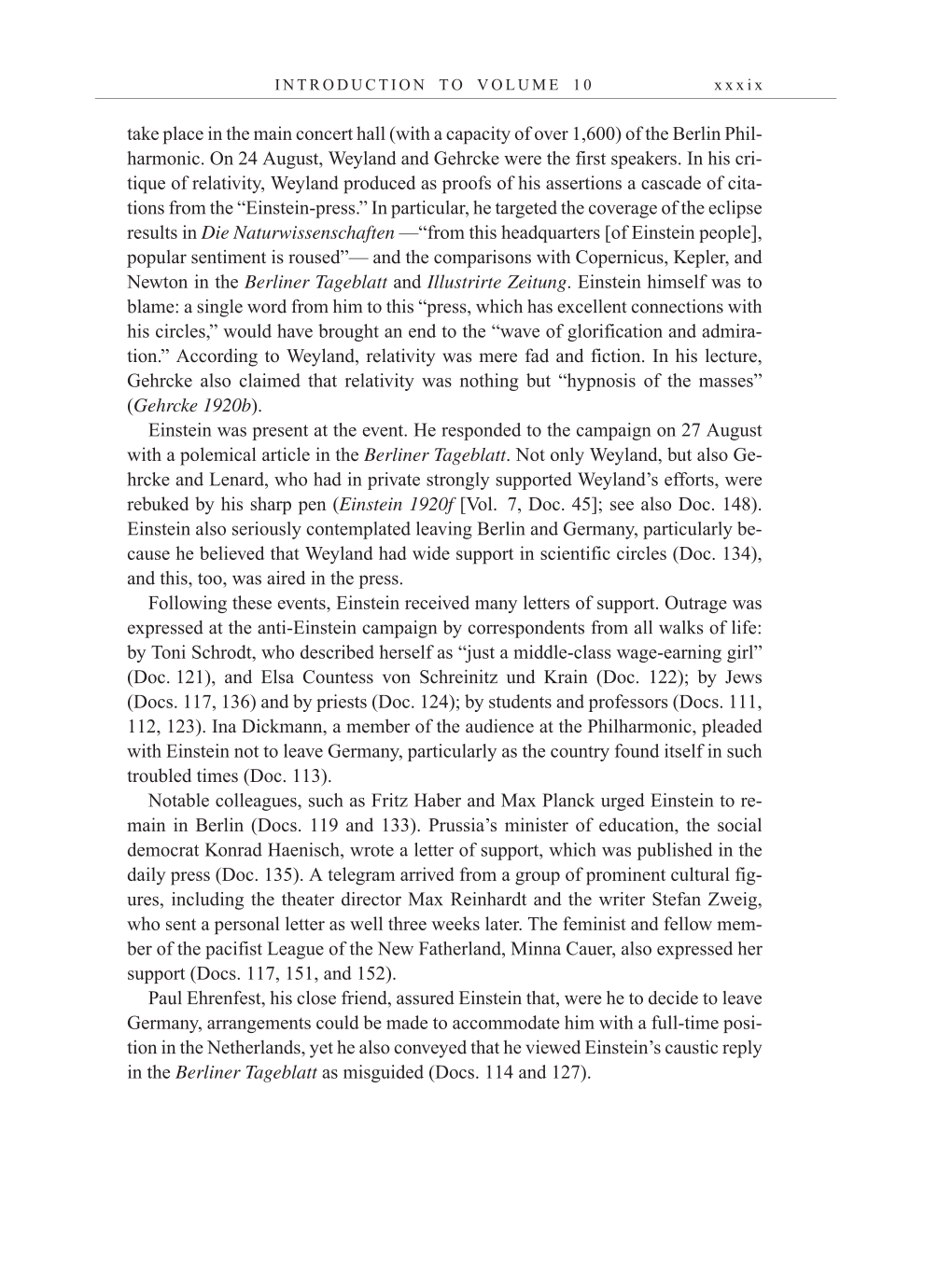I N T R O D U C T I O N T O V O L U M E 1 0 x x x i x
take place in the main concert hall (with a capacity of over 1,600) of the Berlin Phil-
harmonic. On 24 August, Weyland and Gehrcke were the first speakers. In his cri-
tique of relativity, Weyland produced as proofs of his assertions a cascade of cita-
tions from the “Einstein-press.” In particular, he targeted the coverage of the eclipse
results in Die Naturwissenschaften —“from this headquarters [of Einstein people],
popular sentiment is roused”— and the comparisons with Copernicus, Kepler, and
Newton in the Berliner Tageblatt and Illustrirte Zeitung. Einstein himself was to
blame: a single word from him to this “press, which has excellent connections with
his circles,” would have brought an end to the “wave of glorification and admira-
tion.” According to Weyland, relativity was mere fad and fiction. In his lecture,
Gehrcke also claimed that relativity was nothing but “hypnosis of the masses”
(Gehrcke 1920b).
Einstein was present at the event. He responded to the campaign on 27 August
with a polemical article in the Berliner Tageblatt. Not only Weyland, but also Ge-
hrcke and Lenard, who had in private strongly supported Weyland’s efforts, were
rebuked by his sharp pen (Einstein 1920f [Vol. 7, Doc. 45]; see also Doc. 148).
Einstein also seriously contemplated leaving Berlin and Germany, particularly be-
cause he believed that Weyland had wide support in scientific circles (Doc. 134),
and this, too, was aired in the press.
Following these events, Einstein received many letters of support. Outrage was
expressed at the anti-Einstein campaign by correspondents from all walks of life:
by Toni Schrodt, who described herself as “just a middle-class wage-earning girl”
(Doc. 121), and Elsa Countess von Schreinitz und Krain (Doc. 122); by Jews
(Docs. 117, 136) and by priests (Doc. 124); by students and professors (Docs. 111,
112, 123). Ina Dickmann, a member of the audience at the Philharmonic, pleaded
with Einstein not to leave Germany, particularly as the country found itself in such
troubled times (Doc. 113).
Notable colleagues, such as Fritz Haber and Max Planck urged Einstein to re-
main in Berlin (Docs. 119 and 133). Prussia’s minister of education, the social
democrat Konrad Haenisch, wrote a letter of support, which was published in the
daily press (Doc. 135). A telegram arrived from a group of prominent cultural fig-
ures, including the theater director Max Reinhardt and the writer Stefan Zweig,
who sent a personal letter as well three weeks later. The feminist and fellow mem-
ber of the pacifist League of the New Fatherland, Minna Cauer, also expressed her
support (Docs. 117, 151, and 152).
Paul Ehrenfest, his close friend, assured Einstein that, were he to decide to leave
Germany, arrangements could be made to accommodate him with a full-time posi-
tion in the Netherlands, yet he also conveyed that he viewed Einstein’s caustic reply
in the Berliner Tageblatt as misguided (Docs. 114 and 127).
